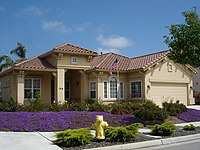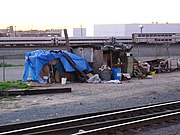Home
This article needs additional citations for verification. (May 2008) |



A home is a place of residence or refuge.[1] When it refers to a building, it is usually a place in which an individual or a family can live and store personal property. Most modern-day households contain sanitary facilities and a means of preparing food. Animals have their own homes as well, either living in the wild or shared with humans in a domesticated environment. "Home" is also used to refer to the geographical area (whether it be a suburb, town, city or country) in which a person grew up or feels they belong, or it can refer to the native habitat of a wild animal. Sometimes, as an alternative to the definition of "home" as a physical locale ("Home is where you hang your hat"), home may be perceived to have no physical location, instead, home may relate instead to a mental or emotional state of refuge or comfort. Popular sayings along these lines are "Home is where the heart is" or "You can never go home again".
There are cultures in which member lack a permanent home, such as nomadic peoples.
Terminology


The word "home" can be used for various types of residential community institutions in which people can live, such as nursing, retirement homes for seniors, prisons for criminals, treatment facilities, etc., and foster homes. A home is generally a place that is close to the heart of the owner, and can become a prized possession.
In computer terminology, a 'home' may refer to a starting view that branches off into other tasks, e.g. a homepage or a desktop. In a full screen editor, home is often used to mean the top-leftmost character cell, or the leftmost cell on a line in a line editor. These are the initial ones used by left-to-right languages. A standard 101-key PC keyboard contains a Home key. Many home pages on the with introductory information, recent news or events, and links to subpages. "Home" may also refer to a home directory which contains the personal files of a given user of the computer system.
Psychological impact
Since it can be said that humans are generally creatures of habit, the state of a person's home has been known to physiologically influence their behavior, emotions, and overall mental health.[citation needed] The loss of a home (due to whatever reason, be it through accident or natural disaster, repossession, or in the case of children simply the decision to move on the part of the parents) can be a valid cause of relocation.
Some people may become homesick when they leave their home over an extended period of time. Sometimes homesickness can cause a person to feel actual symptoms of illness.
It has been argued that psychologically "The strongest sense of home commonly coincides geographically with a dwelling. Usually the sense of home attenuates as one moves away from that point, but it does not do so in a fixed or regular way."[2] Furthermore, places like homes can trigger self-reflection, thoughts about who someone is or used to be or who they might become. These types of reflections also occur in places where there is a collective historical identity, such as Gettysburg or Ground Zero.[3]
Gallery
-
Two-story house with balconies, Texas (Harry Walker, photographer, 1900-1949)
See also
References
- ^ "'Home' – Definitions from Dictionary.com". Dictionary.com. Retrieved 2008-05-08.
- ^ Theankbj;j o S. Terkenli. 1995. "Home as a Region." Geographical Review. 85.3: 324-334.
- ^ Douglas Burton-Christie. 2009. "Place-Making as Contemplative Practice." Anglican Theological Reviews 91.3: 347-371.

